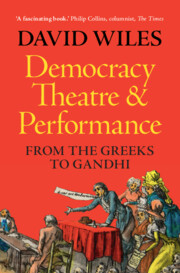1109 results
3 - Berlin Becomes High-Risk Capital
-
- Book:
- Radically Legal
- Print publication:
- 06 June 2024, pp 41-70
-
- Chapter
-
- You have access
- Open access
- HTML
- Export citation
4 - Who Constitutes Power?
-
- Book:
- Radically Legal
- Print publication:
- 06 June 2024, pp 71-102
-
- Chapter
-
- You have access
- Open access
- HTML
- Export citation
5 - Not Only Red
-
- Book:
- Streetscapes of War and Revolution
- Published online:
- 30 May 2024
- Print publication:
- 06 June 2024, pp 207-252
-
- Chapter
- Export citation
5 - Berlin Is the Greatest Extravaganza
-
- Book:
- Radically Legal
- Print publication:
- 06 June 2024, pp 103-136
-
- Chapter
-
- You have access
- Open access
- HTML
- Export citation
4 - Imperial Expansion and Restrictive Elections: 1850–1945
-
- Book:
- Colonial Origins of Democracy and Dictatorship
- Published online:
- 08 May 2024
- Print publication:
- 30 May 2024, pp 90-127
-
- Chapter
- Export citation
Democracy and the Notwithstanding Clause
-
- Journal:
- Canadian Journal of Law & Jurisprudence , First View
- Published online by Cambridge University Press:
- 30 May 2024, pp. 1-26
-
- Article
-
- You have access
- Open access
- HTML
- Export citation
2 - A Theory of Colonial Electoral Institutions
-
- Book:
- Colonial Origins of Democracy and Dictatorship
- Published online:
- 08 May 2024
- Print publication:
- 30 May 2024, pp 25-49
-
- Chapter
- Export citation
6 - Postcolonial Persistence
-
- Book:
- Colonial Origins of Democracy and Dictatorship
- Published online:
- 08 May 2024
- Print publication:
- 30 May 2024, pp 157-193
-
- Chapter
- Export citation
7 - Conclusion
-
- Book:
- Colonial Origins of Democracy and Dictatorship
- Published online:
- 08 May 2024
- Print publication:
- 30 May 2024, pp 194-206
-
- Chapter
- Export citation
5 - Mass Franchise Expansion after 1945
-
- Book:
- Colonial Origins of Democracy and Dictatorship
- Published online:
- 08 May 2024
- Print publication:
- 30 May 2024, pp 128-156
-
- Chapter
- Export citation
1 - Introduction
-
- Book:
- Colonial Origins of Democracy and Dictatorship
- Published online:
- 08 May 2024
- Print publication:
- 30 May 2024, pp 1-24
-
- Chapter
- Export citation
3 - Representation in Settler Colonies through 1850
-
- Book:
- Colonial Origins of Democracy and Dictatorship
- Published online:
- 08 May 2024
- Print publication:
- 30 May 2024, pp 50-89
-
- Chapter
- Export citation
Chapter 8 - Cooperation and the Search for Truth
-
-
- Book:
- Plato's Gorgias
- Published online:
- 25 May 2024
- Print publication:
- 30 May 2024, pp 146-171
-
- Chapter
- Export citation
3 - Cultivating the Value of Democracy in History Teaching
-
-
- Book:
- The Discourse of History
- Published online:
- 16 May 2024
- Print publication:
- 23 May 2024, pp 45-72
-
- Chapter
- Export citation
Rethinking the Constitutional Architecture of EU Executive Rulemaking: Treaty Change and Enhanced Democracy
-
- Journal:
- European Journal of Risk Regulation , First View
- Published online by Cambridge University Press:
- 22 May 2024, pp. 1-19
-
- Article
-
- You have access
- Open access
- HTML
- Export citation
Critical Forum: Populism, Hybrid Democracy, and Youth Cultures
-
- Journal:
- Critical Pakistan Studies ,
- Published online by Cambridge University Press:
- 20 May 2024, pp. 1-31
-
- Article
-
- You have access
- Open access
- HTML
- Export citation

Democracy, Theatre and Performance
- From the Greeks to Gandhi
-
- Published online:
- 17 May 2024
- Print publication:
- 27 June 2024
1 - Introduction
-
- Book:
- How Government Built America
- Published online:
- 08 May 2024
- Print publication:
- 09 May 2024, pp 1-6
-
- Chapter
- Export citation
5 - Rethinking the Islamic Republic
-
- Book:
- How Islam Rules in Iran
- Published online:
- 02 May 2024
- Print publication:
- 09 May 2024, pp 142-201
-
- Chapter
- Export citation
Transformative process theory
-
- Journal:
- Global Constitutionalism , First View
- Published online by Cambridge University Press:
- 09 May 2024, pp. 1-21
-
- Article
-
- You have access
- Open access
- HTML
- Export citation



